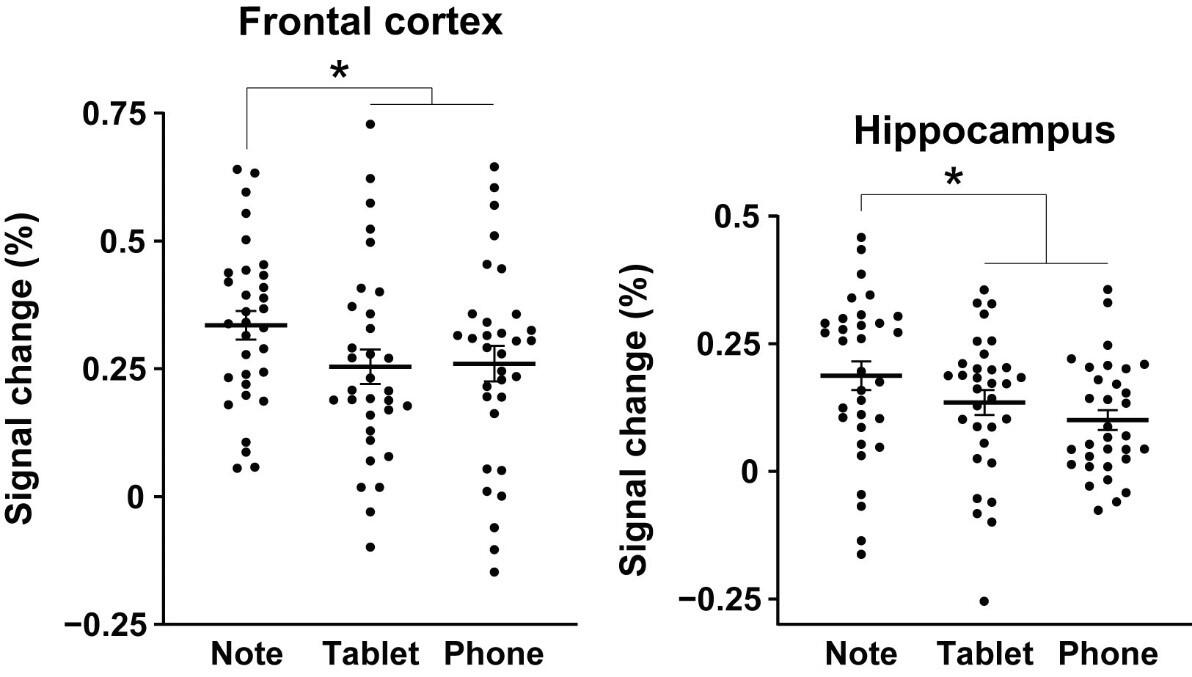It has been found that when writing down information such as schedules, brain activity for memory recall increases quantitatively when using a paper day planner or similar, compared to using electronic devices such as smartphones or tablets. The discovery was made by a joint research group including Professor Kuniyoshi Sakai and graduate student Keita Umejima of the Graduate School of Arts and Sciences, the University of Tokyo, the Japan Management Association (JMA) Management Center (JMAM), and NTT Data Institute of Management Consulting, Inc. The characteristics of paper that are not found in electronic devices are said to enable deeper memorization by affording spacial evidence through the five senses.

Brain activity increases when using the paper day planner.
(Credit: Keita Umejima, Takuya Ibaraki, Takahiro Yamazaki, and Kuniyoshi L. Sakai. 19 March 2021. Paper Notebooks vs. Mobile Devices: Brain Activation Differences During Memory Retrieval. Frontiers in Behavioral Neuroscience. DOI: 10.3389/fnbeh.2021.634158)
We all use paper books and magazines, smartphones, tablets, and PCs on a daily basis, but there has not been adequate research on the influence each has on the brain. Previous research has shown through behavioral experiments that handwriting is more effective for memorization than typing on a keyboard, but the difference in memory recall that resulted from that memorization, and the underlying neural base, were not yet understood.
Accordingly, the research group had subjects enter their schedules into commonly used paper day planners, tablets, and smartphones to examine whether each influenced memory recall and changes in brain activity.
The experiment selected 48 subjects between the ages of 18 and 29 (including subjects from both students of the University of Tokyo and the general public), and divided them into three teams of 16 subjects each, for each of the three mediums of paper day planner, tablet, and smartphone. The teams were then assigned the task of writing specific schedules using those items. Pens were used to write both in the paper day planners and on the tablets (touch sensitive) where the paper day planner and the tablet were similar in physical layout (size and orientation). The teams then carried out an entirely different activity for one hour, after which they were asked to recall the content of the schedule while undergoing MRI scans. The subjects were not told to memorize the information beforehand in order to recreate the typical schedule planning one would do on a daily basis.
The results of the experiment showed that the paper day planner team had the same success rate answering memory recall questions as the other two teams despite completing the task of recording the schedules faster, demonstrating that the team was able to memorize the information in less time. Also, the day planner team performed better than the tablet team on simple questions.
fMRI measurements of brain activity during the memory recall questions showed a rise in brain activity in all three teams in areas of the brain known to control vision in addition to the lateral premotor cortex and inferior frontal gyrus, related to language processing, and the hippocampus, related to memory processing. The measurements also showed that the brain activity of the paper day planner team was quantitatively higher in all those regions compared to the other teams.
Position is important - paper helpful for memory
According to Sakai, "Areas of the brain involved in language, memory, and vision work together, and the fact that the activity differs between paper day planners and tablets means that the difference in memorization between the mediums appears as differences in recall. For example, it is often said that compared to reviewing information on a screen, it is possible to find mistakes much more quickly if you print out the information and review it on paper. This is because the information is not only text, it includes position as well, and this makes it easier to recall the information from storage in the brain. When you scroll the page on a tablet, you lose the positional information. Writing notes or adding post-its in a notebook or textbook helps memory because it involves information on what can be found where. Today, digital technology is being used increasingly to improve efficiency, but in the end, paper is more helpful in fixating memories."
This article has been translated by JST with permission from The Science News Ltd.(https://sci-news.co.jp/). Unauthorized reproduction of the article and photographs is prohibited.




